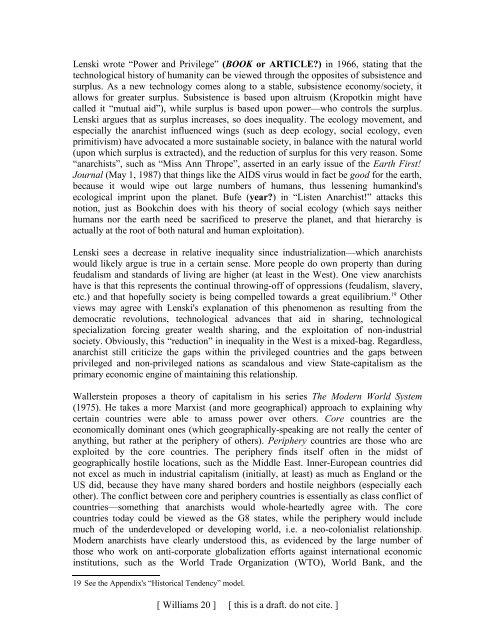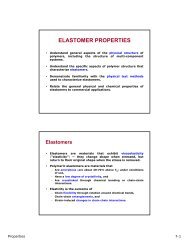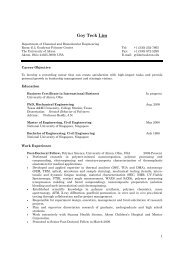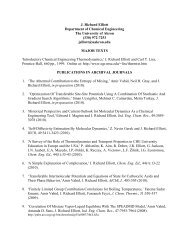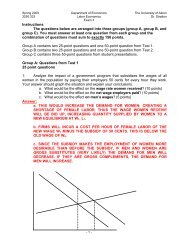Sociology of the Anarchists - Gozips.uakron.edu - The University of ...
Sociology of the Anarchists - Gozips.uakron.edu - The University of ...
Sociology of the Anarchists - Gozips.uakron.edu - The University of ...
You also want an ePaper? Increase the reach of your titles
YUMPU automatically turns print PDFs into web optimized ePapers that Google loves.
Lenski wrote “Power and Privilege” (BOOK or ARTICLE?) in 1966, stating that <strong>the</strong><br />
technological history <strong>of</strong> humanity can be viewed through <strong>the</strong> opposites <strong>of</strong> subsistence and<br />
surplus. As a new technology comes along to a stable, subsistence economy/society, it<br />
allows for greater surplus. Subsistence is based upon altruism (Kropotkin might have<br />
called it “mutual aid”), while surplus is based upon power—who controls <strong>the</strong> surplus.<br />
Lenski argues that as surplus increases, so does inequality. <strong>The</strong> ecology movement, and<br />
especially <strong>the</strong> anarchist influenced wings (such as deep ecology, social ecology, even<br />
primitivism) have advocated a more sustainable society, in balance with <strong>the</strong> natural world<br />
(upon which surplus is extracted), and <strong>the</strong> r<strong>edu</strong>ction <strong>of</strong> surplus for this very reason. Some<br />
“anarchists”, such as “Miss Ann Thrope”, asserted in an early issue <strong>of</strong> <strong>the</strong> Earth First!<br />
Journal (May 1, 1987) that things like <strong>the</strong> AIDS virus would in fact be good for <strong>the</strong> earth,<br />
because it would wipe out large numbers <strong>of</strong> humans, thus lessening humankind's<br />
ecological imprint upon <strong>the</strong> planet. Bufe (year?) in “Listen Anarchist!” attacks this<br />
notion, just as Bookchin does with his <strong>the</strong>ory <strong>of</strong> social ecology (which says nei<strong>the</strong>r<br />
humans nor <strong>the</strong> earth need be sacrificed to preserve <strong>the</strong> planet, and that hierarchy is<br />
actually at <strong>the</strong> root <strong>of</strong> both natural and human exploitation).<br />
Lenski sees a decrease in relative inequality since industrialization—which anarchists<br />
would likely argue is true in a certain sense. More people do own property than during<br />
feudalism and standards <strong>of</strong> living are higher (at least in <strong>the</strong> West). One view anarchists<br />
have is that this represents <strong>the</strong> continual throwing-<strong>of</strong>f <strong>of</strong> oppressions (feudalism, slavery,<br />
etc.) and that hopefully society is being compelled towards a great equilibrium. 19 O<strong>the</strong>r<br />
views may agree with Lenski's explanation <strong>of</strong> this phenomenon as resulting from <strong>the</strong><br />
democratic revolutions, technological advances that aid in sharing, technological<br />
specialization forcing greater wealth sharing, and <strong>the</strong> exploitation <strong>of</strong> non-industrial<br />
society. Obviously, this “r<strong>edu</strong>ction” in inequality in <strong>the</strong> West is a mixed-bag. Regardless,<br />
anarchist still criticize <strong>the</strong> gaps within <strong>the</strong> privileged countries and <strong>the</strong> gaps between<br />
privileged and non-privileged nations as scandalous and view State-capitalism as <strong>the</strong><br />
primary economic engine <strong>of</strong> maintaining this relationship.<br />
Wallerstein proposes a <strong>the</strong>ory <strong>of</strong> capitalism in his series <strong>The</strong> Modern World System<br />
(1975). He takes a more Marxist (and more geographical) approach to explaining why<br />
certain countries were able to amass power over o<strong>the</strong>rs. Core countries are <strong>the</strong><br />
economically dominant ones (which geographically-speaking are not really <strong>the</strong> center <strong>of</strong><br />
anything, but ra<strong>the</strong>r at <strong>the</strong> periphery <strong>of</strong> o<strong>the</strong>rs). Periphery countries are those who are<br />
exploited by <strong>the</strong> core countries. <strong>The</strong> periphery finds itself <strong>of</strong>ten in <strong>the</strong> midst <strong>of</strong><br />
geographically hostile locations, such as <strong>the</strong> Middle East. Inner-European countries did<br />
not excel as much in industrial capitalism (initially, at least) as much as England or <strong>the</strong><br />
US did, because <strong>the</strong>y have many shared borders and hostile neighbors (especially each<br />
o<strong>the</strong>r). <strong>The</strong> conflict between core and periphery countries is essentially as class conflict <strong>of</strong><br />
countries—something that anarchists would whole-heartedly agree with. <strong>The</strong> core<br />
countries today could be viewed as <strong>the</strong> G8 states, while <strong>the</strong> periphery would include<br />
much <strong>of</strong> <strong>the</strong> underdeveloped or developing world, i.e. a neo-colonialist relationship.<br />
Modern anarchists have clearly understood this, as evidenced by <strong>the</strong> large number <strong>of</strong><br />
those who work on anti-corporate globalization efforts against international economic<br />
institutions, such as <strong>the</strong> World Trade Organization (WTO), World Bank, and <strong>the</strong><br />
19 See <strong>the</strong> Appendix's “Historical Tendency” model.<br />
[ Williams 20 ] [ this is a draft. do not cite. ]


